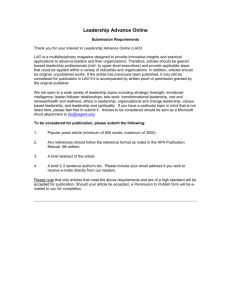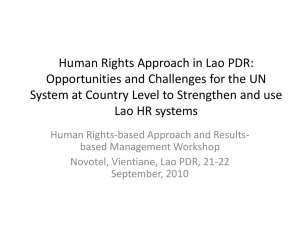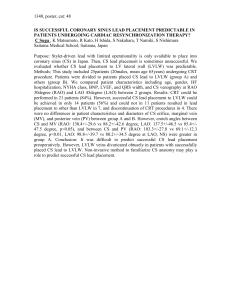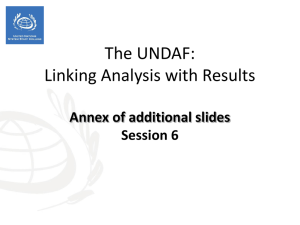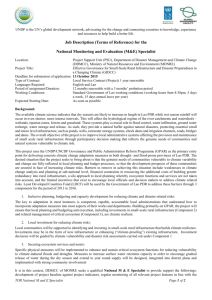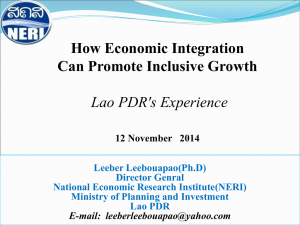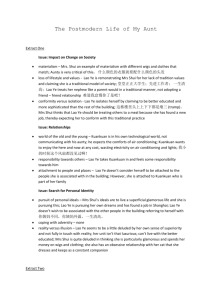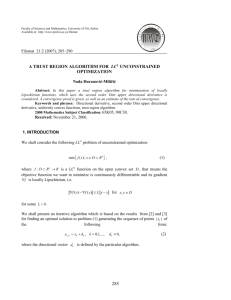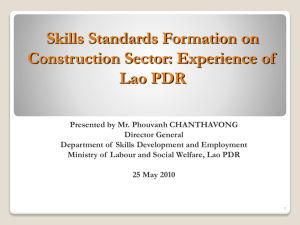Lao PDR Constitution
advertisement
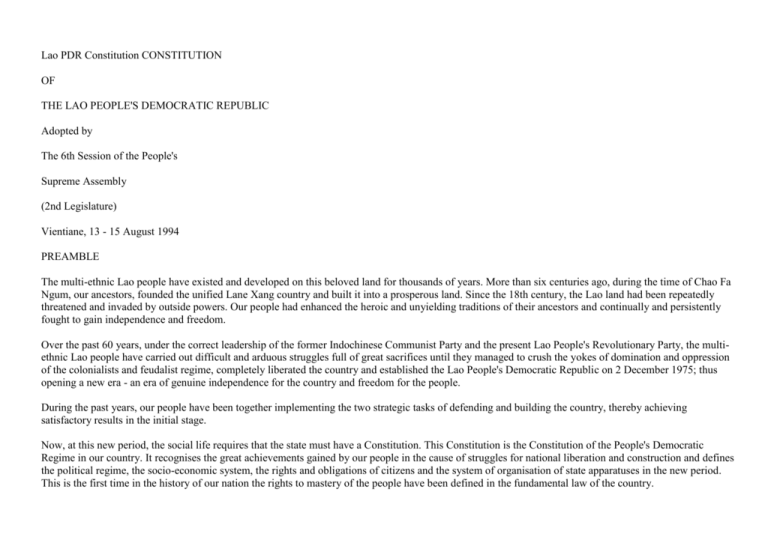
Lao PDR Constitution CONSTITUTION OF THE LAO PEOPLE'S DEMOCRATIC REPUBLIC Adopted by The 6th Session of the People's Supreme Assembly (2nd Legislature) Vientiane, 13 - 15 August 1994 PREAMBLE The multi-ethnic Lao people have existed and developed on this beloved land for thousands of years. More than six centuries ago, during the time of Chao Fa Ngum, our ancestors, founded the unified Lane Xang country and built it into a prosperous land. Since the 18th century, the Lao land had been repeatedly threatened and invaded by outside powers. Our people had enhanced the heroic and unyielding traditions of their ancestors and continually and persistently fought to gain independence and freedom. Over the past 60 years, under the correct leadership of the former Indochinese Communist Party and the present Lao People's Revolutionary Party, the multiethnic Lao people have carried out difficult and arduous struggles full of great sacrifices until they managed to crush the yokes of domination and oppression of the colonialists and feudalist regime, completely liberated the country and established the Lao People's Democratic Republic on 2 December 1975; thus opening a new era - an era of genuine independence for the country and freedom for the people. During the past years, our people have been together implementing the two strategic tasks of defending and building the country, thereby achieving satisfactory results in the initial stage. Now, at this new period, the social life requires that the state must have a Constitution. This Constitution is the Constitution of the People's Democratic Regime in our country. It recognises the great achievements gained by our people in the cause of struggles for national liberation and construction and defines the political regime, the socio-economic system, the rights and obligations of citizens and the system of organisation of state apparatuses in the new period. This is the first time in the history of our nation the rights to mastery of the people have been defined in the fundamental law of the country. This Constitution is the fruit of the process of the people's discussions throughout the country. It reflects the long-standing aspirations and strong determination of the national community to strive together to fulfill the objective of building Laos a country of peace, independence, democracy, unity and prosperity. CHAPTER I THE POLITICAL REGIME Article 1. The Lao People's Democratic Republic is an independent country with sovereignty and territorial integrity covering both territorial waters and airspace. It is a unified country belonging to all multi-ethnic people and is indivisible. Article 2. The state of the Lao People's Democratic Republic is a People's Democratic State. All powers are of the people, by the people and for the interests of the multi-ethnic people of all strata in society with the workers, farmers and intellectuals as key components. Article 3. The rights of the multi-ethnic people to be the masters of the country are exercised and ensured through the functioning of the political system with the Lao People's Revolutionary Party as its leading nucleus. Article 4. The National Assembly is the organisation of the people's representatives. The election of members of the National Assembly shall be carried out through the principles of universal, equal and direct suffrage, and secret balloting. Voters have the right to propose the dismissal of their own representatives if they are found to behave unfit to their honour and to lose the people's confidence. Article 5. The National Assembly and all other state organisations are established and function in accordance with the principle of democratic centralism. Article 6. The state protects the freedom and democratic rights of the people which cannot be violated by anyone. All state organisations and functionaries must popularise and propagate all policies, regulations and laws among the people and, together with the people, organise their implementations in order to guarantee the legitimate rights and interests of the people. All acts of bureaucratism and harassment that can be physically harmful to the people and detrimental to their honour, lives, consciences and property are prohibited. Article 7. The Lao Front for National Constitution, the Lao Federation of Trade Union, the Lao People's Revolutionary Youth Union, the Lao Women's Union and other social organisations are the organs to unite and mobilise all strata of the multi-ethnic people for taking part in the tasks of national defence and construction; develop the rights to mastership of the people and protect the legitimate rights and interests of members of their respective organisations. Article 8. The state pursues the policy of promoting unity and equality among all ethnic groups. All ethnic groups have the rights to protect, preserve, and promote the fine customs and cultures of their own tribes and of the nation. All acts of creating division and discrimination among ethnic groups are prohibited. The state implements every measure to gradually develop and upgrade the levels of socio-economy of all ethnic groups. Article 9. The state respects and protects all lawful activities of the Buddhists and of other religious followers mobilises and encourages the Buddhist monks and novices as well as the priests of other religions to participate in the activities which are beneficial to the country and people. All acts of creating division of religions and classes of people are prohibited. Article 10. The state manages the society by the provisions of the Constitution and laws. All party and state organisations, mass organisations, social organisations and all citizens must function within the bounds of the Constitution and laws. Article 11. The state implements the policy of national defence and security with the participation of all people in all aspects. The national defence and security forces must enhance their loyalty to the country and people ; carry out the duty to protect the gains of the revolution, the lives, property and labour of the people ; and contribute to the tasks of national development. Article 12. The Lao People's Democratic Republic pursues the foreign policy of peace, independence, friendship and cooperation; and promotes the relations and cooperation with all countries on the basis of the principles of peaceful coexistence ; respect for - each other's independence, sovereignty and territorial integrity; non-interference in each other's internal affairs ; equality and mutual inerests. The Lao People's Democratic Republic supports the struggle of the world people for peace, national independence, democracy, and social progress. CHAPTER II THE SOCIO - ECONOMIC SYSTEM Article 13. The economic system of the Lao People's Democratic Republic relies on the multi-sectoral economy with the objective of expanding production and broadening the circulation of goods, and transforming the natural economy into a goods economy in order to increasingly develop the bases of national economy and improve the material and spiritual living conditions of the multi- ethnic people. Article 14. The state protects and expands all forms of state, collective and individual ownership, as well as private ownership of domestic capitalists and foreigners who make investments in the Lao People's Democratic Republic. The state encourages all economic sectors to compete and cooperate with one another in expanding their production and business. All economic sectors are equal before law. Article 15. The state protects the right to ownership (rights to governing, rights to using to transferring) and the rights to inherit property of organisations and individuals. As for the land which is under the ownership of the national community, the state ensures the rights to using, transferring, and inheriting it in accordance with the law. Article 16. The economic management is carried out in line with the mechanism of market economy with the adjustment by the state, implementing the principle of promoting the centralised, unified management of the central branches in combination with the division of managerial responsibility for localities. Article 17. All organisations and citizens must protect the environment and natural resources: land, underground, forests, fauna, water sources and atmosphere. Article 18. The state promotes and gives advice on the development of economic relations, under many forms, with foreign countries on the basis of the principle of respect for each other's independence, sovereignty, equality, and mutual benefits. Article 19. The state pays attention to developing education in combination with the building of the new generation to be good citizens. The objectives of the educational, cultural and scientific activities are to raise the level of knowledge, the patriotic spirit, the spirit of cherishing the People's Democratic Regime, the spirit of maintaining unify and harmony among the people of various ethnic groups ; enhance the sense of being masters of the country ; and implement the compulsory education system at primary levels. The state authorises the operation of private schools which function under the curricula of the state. The state together with the people build schools at all levels to turn education into a comprehensive system ; and pay attention to developing education in the areas where the ethnic minority people reside. The state develops and expands the fine, traditional culture of the nation in combination with adopting the progressive culture of the world ; eliminates all negative phenomena in the ideological and cultural spheres; promotes culture, art, literature and information activities, including in mountainous areas ; and protects the antiques and shrines of the nation. Article 20. The state pays attention to expanding the public health service, allows private individuals to operate medical services in accordance with state regulations. The state promotes the expansion of sports, gymnastics, and tourism ; pays attention to taking cares of disabled combatants, families of those who have sacrificed their lives and who have committed good deeds for the nation, and pensioners. The State pays attention to pursuing the policy toward mothers and children. CHAPTER III FUNDAMENTAL RIGHTS AND OBLIGATIONS OF THE CITIZEN Article 21. Lao citizens are the persons who hold Lao nationality as prescribed by law. Article 22. Lao citizens irrespective of their sex, social status, education, faith and ethnic groups are all equal before the law. Article 23. Lao citizens 18 years of age and over have the right to vote and the right to be elected at the age of 21 and over except insane persons and the persons whose rights to vote and to be elected have been revoked by a court. Article 24. Citizens of both sexes enjoy equal rights in the political, economic, cultural and social fields and family affairs. Article 25. Lao citizens have the right to receive education. Article 26. Lao citizens have the right to work and engage in occupations which are not against the law. Working people have the right to rest, to receive medical treatment in time of ailment to receive assistance in case of incapacity and disability, in old age, and other cases as prescribed by law. Article 27. Lao citizens have the freedom of settlement and movement as prescribed by law. Article 28. Lao citizens have the right to lodge complaints and petitions and to propose ideas with state organisations concerned in connection with issues pertaining to the right and interests of both collectives and individuals. Complaints, petitions and ideas of citizens must be considered for solution as prescribed by law. Article 29. The right of Lao citizens in their bodies and houses are inviolable. Lao citizens cannot be arrested or searched without warrant or approval of the authorized organisations, except in the cases as prescribed by law. Article 30. Lao citizens have the right and freedom to believe or not to believe in religions. Article 31. Lao citizens have the right and freedom of speech, press and assembly; and have the right to set up associations and to stage demonstrations which are not contrary to the law. Article 32. Lao citizens have the right and freedom to conduct study and to apply advanced sciences, techniques and technologies; to create artistic and literary works and to engage in cultural activities which are not contrary to the law. Article 33. The state protects the legitimate rights and interests of Lao citizens residing abroad. Article 34. Lao citizens have the obligations to respect the Constitution and laws, and to observe labour discipline, the regulations in carrying out livelihood in society, and the regulations and order of the country. Article 35. Lao citizens have the obligations to pay taxes and duties in accordance with the law. Article 36. Lao citizens have the obligations to defend the country, to maintain the people's security and to fulfill military obligations as prescribed by law. Article 37. The aliens and persons having no nationality have the right to enjoy their rights and freedom protected by the provisions of laws of the Lao People's Democratic Republic. They have the right to lodge petitions with courts and other organisations concerned of the Lao People's Democratic Republic and the obligations to respect the Constitution and laws of the Lao People's Democratic Republic. Article 38. The Lao People's Democratic Republic grants asylum to foreigners who are persecuted for their struggle for freedom, justice, peace and scientific causes. CHAPTER IV THE NATIONAL ASSEMBLY Article 39. The National Assembly is the legislative organisation. It has the right to make decisions on the fundamental issues of the country. At the same time, it is the organisation which supervises and oversees the activities of the administrative and judicial organisations: Article 40. The National Assembly has the following rights and duties: 1. To establish, endorse or amend the Constitution; 2. To consider, endorse, amend, or abrogate laws; 3. To determine, change, or abolish taxes and duties; 4. To consider and approve the strategic plans of socio-economic development and budget of the state; 5. To elect or remove the President of state and the Vice- President of state on the recommendation of the National Assembly Standing Committee; 6. To consider and approve the appointment or removal of the members of the government on the recommendation of the President of State; 7. To elect or remove the President of the People's Supreme Court and the Public Prosecutor-General on the recommendation of the National Assembly Standing Committee; 8. To decide on the establishment or dissolution of the ministries, ministry-equivalent organisations, provinces and municipalities and to determine the boundaries of provinces and municipalities on the recommendation of the Prime Minister; 9. To decide on granting general amnesties; 10. To decide on the ratification or abolition of treaties and agreements signed with foreign countries in accordance with international law and regulations; 11. To decide on matters of war or peace; 12. To supervise the observance of the Constitution and laws; 13. To exercise other rights and execute other duties as prescribed by law. Article 41. Members of the National Assembly are elected by the Lao citizens in accordance with the provisions stipulated in the law. The term of office the National Assembly is five years. The election of the new National Assembly must be held not later than two months prior to the expiration of the term of office of the incumbent National Assembly. In the case of war or any other circumstances that obstructs the election, the National Assembly may extend its term of office but it must carry out the election of the new National Assembly not later than six months after the situation returns to normal. Article 42. The National Assembly elects its own Standing Committee which consists of the President, Vice-President and a number of members. The President and Vice-President of the National Assembly are also President and Vice-President of the National Assembly Standing Committee. Article 43. The National Assembly convenes its ordinary session twice a year at the summoning of the National Assembly Standing Committee. The National Assembly Standing Committee may covene an extraordinary session of the National Assembly if it deems necessary. Article 44. The National Assembly session shall be convened only with the presence of more than one-half of the total number of the National Assembly members. The resolutions of the National Assembly shall be valid only when they are voted for by more than one-half of the total number of the National Assembly members present at the session, except in the cases prescribed in Article 54 and Article 80 of the Constitution. Article 45. The organisations and persons that have the rights to propose draft laws are as follows: 1. The President of state; 2. The National Assembly Standing Committee; 3. The Government; 4. The People's Supreme Court; 5. The Public Prosecutor-General; 6. The mass organisations at the central level. Article 46. Laws already adopted by the National Assembly must be promulgated by the President of state not later than thirty days after their endorsement. During this period, the President of state has the right to request the National Assembly to reconsider such laws. If the National Assembly affirms to adhere to its previous decision in reconsidering such laws, the President of state must promulgate them within fifteen days. Article 47. The questions related to the destiny of the country and the vital interests of the people must be submitted for approval of the National Assembly or the National Assembly Standing Committee during the two sessiuns of the National Assembly. Article 48. The National Assembly Standing Committee has the following rights and duties: 1. To prepare for the National Assembly sessions and to ensure the implementation by the National Assembly of the program of activity it has set forth; 2. To interpret and explain the provisions of the constitution and laws; 3. To supervise and oversee the activities of the administrative and judicial organisations during the recess of the National Assembly; 4. To summon the National Assembly into sessions; 5. To exercise other rights and execute other duties as prescribed by law. Article 49. The National Assembly establishes its own committees to consider draft laws, draft state decrees and state acts submitted to the National Assembly Standing Committee and the President of state ; and to assist the National Assembly and the National Assembly Standing Committee in exercising the rights of supervision of the functioning of the administrative and judicial organisations. Article 50. Members of the National Assembly have the right to interpellate the members of the government, the President of the People's Supreme Court and the Public Prosecutor - General. Organisations or persons interpellated must give verbal or written answers at the National Assembly session. Article 51. Members of the National Assembly shall not be prosecuted in court or detained without the approval of the National Assembly or the National Assembly Standing Committee during the two sessions of the National Assembly. In cases involving gross and urgent offenses, the organisations detaining members of the National Assembly must immediately report to the National Assembly or to the National Assembly Standing Committee during the two sessions of the National Assembly for consideration and decisions concerning them. Inquiries and interrogations shall not cause the absence of prosecuted members from the National Assembly session. CHAPTER V THE PRESIDENT OF STATE Article 52. The President of state is the Head of state of the Lao People's Democratic Republic and the representative of the multi-ethnic Lao people both at home and abroad. Article 53. The President of state has the following rights and duties 1. To promulgate the Constitution and laws already endorsed by the National Assembly; 2. To issue state decrees and state acts on the recommendation of the National Assembly Standing Committee; 3. To appoint or remove the Prime Minister and the members of the government with the approval or resolution of no confidence of the National Assembly; 4. To appoint, transfer or remove the governors of provinces and the mayors of municipalities on the recommendation of the Prime Minister; 5. To decide to promote or demote the ranks of the Generals in the national defence and security forces on the recommendation of the Prime Minister; 6. To be the Head of the people's armed forces; 7. To preside over a meeting of the government when necessary; 8. To decide on the conferment of the national gold medals, orders of Merit, medals of victory and highest honorific titles of the state; 9. To decide on granting pardons; 10. To decide on general or partial military conscription and to declare the state of emergency all over the country or in any particular locality; 11. To declare on the ratification or abolition of all treaties and agreements signed with foreign countries; 12. To appoint and recall plenipotentiary representatives of the Lao People's Democratic Republic to or from foreign countries, and accept the plenipotentiary representatives of foreign countries accredited to the Lao People's Democratic Republic; 13. To exercise other rights and execute other duties as stipulated in the laws. Article 54. The President of state is elected by the National Assembly with two-thirds of the votes of all members of the National Assembly attending the session. The term of office of the President of state is five years. Article 55. The President of state may have a Vice-President as an assistant to act on behalf of the President during his absence. The Vice-President of state is elected by the National Assembly with the votes of more than one-half of the total number of the National Assembly members attending the session. CHAPTER VI THE GOVERNMENT Article 56. The government is the administrative organisation of the state. The government manages in a unified manner the implementation of duties of state in all fields: political, economic, cultural, social, national defence and security, and foreign affairs. Article 57. The government has the following rights and duties 1. To implement the Constitution, laws and resolutions of the National Assembly as well as state decrees and acts of the President of state; 2. To submit draft laws to the National Assembly ; draft decrees and acts to the President of state; 3. To map out the strategic plans on the socio-economic development and annual state budgets and submit them to the National Assembly for consideration and approval; 4. To issue decrees and decisions on the management of socio-economic, scientific and technical fields national defence and security ; and foreign affairs; 5. To organise, guide and supervise the functioning of the managerial organisations of all branches and of local administrative organisations; 6. To organise and supervise the activities of the national defence and security forces; 7. To sign treaties and agreements with foreign countries and guide their implementation; 8. To suspend or revoke decisions, instructions of the ministries, the ministry-equivalent organisations, organisations attached to the government, and local administrative organisations if they run counter to laws; 9. To exercise other rights and execute other duties as stipulated by law. Article 58. The government consists of the Prime Minister, Deputy Prime Ministers, ministers and chairmen of the ministry- equivalent committees. The term of office of the government is five years. Article 59. The Prime Minister is appointed by the President of state with the approval of the National Assembly. The term of office of the government is five years. Article 60. The Prime Minister is the Head of the government; guides and supervises the work of the government; represents the government in guiding the work of ministries, the Ninistry-equivalent organisations and other organisations attached to the government ; and guides the work of the governors of provinces and the mayors of municipalities. The Prime Minister appoints deputy ministers and deputy Chairman of the ministry-equivalent committees, deputy governors, deputy mayors and district chiefs. The Deputy Prime Ministers are the assistants of the Prime Minister. The Prime Minister may assign a particular Deputy Prime Minister to carry out work on his behalf in case he is engaged. Article 61. The National Assembly may pass a vote of no confidence in the government or any member of the government if the National Assembly Standing Committee or one-fourth of the total number of the National Assembly members raise the question. Within twenty-four hours after the vote of no confidence in the government by the National Assembly, the President of state has the right to bring the no confidence question to the National Assembly for reconsideration. The second consideration must be held within the forty-eight hours interval from the first consideration. If the new vote of no confidence in the government is passed the government must resign. CHAPTER VII THE LOCAL ADMINISTRATION Article 62. In the Lao People's Democratic Republic, there are provinces, municipalities, districts and villages. Provinces and municipalities have governors and mayors respectively. Districts have district chiefs and village have village heads. Governors and mayors have deputy governors and deputy mayors respectively. District chiefs have Deputy district chiefs as assistants. In densely populous villages, village heads have deputy village heads as assistants. Article 63. The governors, the mayors and the district chiefs have the following rights and duties: 1. To ensure the implementation of the Constitution and laws, and to organise the strict implementation of decisions and instructions issued by the higher levels; 2. To guide and supervise the functioning of all branches of work at all levels under the scope of their responsibility; 3. To suspend the implementation or abolish the decisions of all branches of work at their own or lower levels, which contradict the regulations and laws; 4. To consider and resolve the complaints, petitions and proposals of the people under the scope of their rights and power as stipulated by law. Article 64. The village heads have the responsibility in organizing the implementation of the state's laws, decisions and instructions, maintaining peace and security of the village ; and developing the villages to become firm in all fields. CHAPTER VIII THE JUDICIARY ORGANISATIONS A. THE PEOPLE'S COURTS Article 65. The People's Courts are the judiciary organisations of the state comprising the People's Supreme Court, People's Provincial and Municipal Courts, People's District Courts and Military Courts. Article 66. The People's Supreme Court is the highest judiciary organisation of the state. The People's Supreme Court scrutinizes the sentences reached by the people's local courts and the military courts. Article 67. The Vice-President of the People's Supreme Court and the judges of the people's courts at all levels are appointed or removed by the National Assembly Standing Committee. Article 68. The People's Courts make judges are to be independent and subject only to the law. Article 69. Trials of cases at courts proceedings must be openly conducted except in cases as stipulated by law. The defendants have the right to defend themselves in the cases they are accused. The board of legal counselors have the right to in providing legal assistance to the defendants. Article 70. Representatives of social organisations have the right to take part in court proceedings as provided by law. Article 71. The sentences reached by the people's courts, which have become legally effective, must be respected by the party, state and social organisations and all citizens. the persons and organisations concerned must strictly implement them. B. THE PUBLIC PROSECUTION INSTITUTES Article 72. The Public Prosecution Institutes consist of the Public Prosecutor-General Institute, the Public Prosecution Institutes of provinces, municipalities, and districts, and the military prosecution institutes. The Public Prosecution Institutes have the following rights and duties: 1. To control the unified and correct observance of laws by all ministries, organisations attached to the government, social organisations, local administrative organisations, enterprises, state employees and all citizens; 2. To exercise the right of public prosecution. Article 73. In carrying out their duties, the Public Prosecution Institutes are subject only to the laws and the instructions of the Public Prosecutor-General. CHAPTER IX LANGUAGE, SCRIPT, NATIONAL EMBLEM, NATIONAL FLAG, NATIONAL ANTHEM AND CAPITAL CITY Article 75. The Lao language and Lao script are the language and script officially used. Article 76. The National Emblem of the Lao People's Democratic Republic is a circle depicting in the bottom part one- half of a cog wheel and red ribbon with the inscription "Lao People's Democratic Republic", and decorated with crescent-shaped ears of rice on the two sides and red ribbon stretched between the middle of the rice ears with the inscription "Peace, Independence, Democracy, Unity and Prosperity". A picture of that Luang Pagoda is located between the t.i.ps of the rice ears. A road, a paddy field a forest, and a hydroelectric dam are depicted in the middle of the circle. Article 77. The National Flag of the Lao People's Democratic Republic is dark blue with red edges and a white moon. The width of the flag is two-thirds of its length. The area of the red edges on each side is one-half of the dark blue area. The area of the white moon is equal to four-fifths of the dark blue area. Article 78. The national anthem of the Lao People's Democratic Republic is "Xat Lao" song. Article 79. The Capital city of the Lao People's Democratic Republic is Vientiane. CHAPTER X THE LAST PROVISION Article 80. Only the National Assembly of the Lao People's Democratic Republic has the right to amend the Constitution. The amendment to the Constitution requires the votes of approval cast by at least two-thirds of the total number of the National Assembly members.
